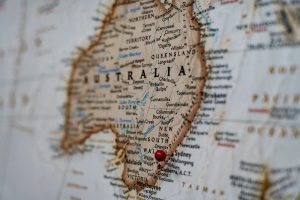Australians are feeling less safe now than at any other time in recent history, citing concerns of a global economic downturn, climate change, and growing distrust in China, according to an annual survey by the Lowy Institute.
Just 50 percent of Australians say they feel safe in 2020, a 28-point drop since 2018. According to the report, nontraditional security threats have now eclipsed traditional security threats, with three in four Australians saying that drought, water shortages, and the COVID-19 epidemic pose a “critical threat to Australia’s vital interests.”
Fear of the global economy tanking has also risen sharply in light of the pandemic, with 71 percent of Australians viewing it as a critical threat. Climate change and environmental disasters, such as bushfires and floods, followed.
Climate change has caused a bitter divide in Australia for much of the past decade. Since 2010, climate policy disputes have toppled three Australian prime ministers and the current government is now grappling with how to tackle an effective energy transition. In the past, much of the conversation was centered around the decade-long drought across much of the country, but concerns about climate change have peaked since devastating bushfires burned through more than 18 million hectares earlier this year.
More concerning for Australians though, according to the poll, are the economic fallout and public health risks of COVID-19. While Australia has so far dealt with the outbreak markedly well, the government did concede earlier this month that the country is already in a recession and that the worst is yet to come. The most recent statistics suggest that almost a million Australians have lost their jobs since pandemic restrictions came into effect.
One of the more dramatic shifts in the survey since last year is Australians’ trust in China to act responsibly in the world. In the past two years, trust has more than halved, down from 52 percent in 2018 to just 23 percent in 2020. Almost all Australians (94 percent) agree that the government should “work to find other markets for Australia to reduce our economic dependence on China.” This is the single largest point of agreement in the history of the Lowy Institute poll.
A majority of Australians are also skeptical of other forms of cooperation between Australia and China, including joint scientific research, allowing Chinese companies to supply technology and critical infrastructure in Australia, and conducting joint military exercises.
The poll did find, however, that Australians support a cooperative relationship with China on “jointly funding aid projects in the Pacific and Asia.”
Trust in China acting responsibly in the world hitting an all-time-low comes amid heightened tension between Canberra and Beijing.
Last week, the Australian Security and Intelligence Organization and the Australian Federal Police raided the home of a New South Wales state MP over allegations of Chinese infiltration. According to the Lowy poll, 42 percent of Australians said foreign interference in Australian politics is a critical threat.
Earlier last week, Prime Minister Scott Morrison announced that “Australian organizations are currently being targeted by a sophisticated state-based cyber actor.” Morrison avoided naming who may be responsible for the attacks, but security experts were quick to identify China as the only country that had the means and capacity to carry out such an operation. The announcement came just one week after Twitter removed 23,750 profiles linked to the Chinese government that were found to be sharing misinformation. Just ahead of foreign interference, 44 percent of Australians said “the dissemination of false information and fake news” is a critical threat to Australia’s interests.
Natasha Kassam, head of polling at the Lowy Institute, told the Sydney Morning Herald that Australians were responding to the Chinese government’s behavior as well as the media coverage of it.
“There hasn’t been a good news story about China in Australia for months, if not years. Coronavirus has something to do with that, but Australians are also hearing about Hong Kong, Xinjiang, Huawei and aggressive diplomats on a daily basis,” she said. “Until very recently, the majority of Australians viewed China as an economic opportunity… Australians are now starting to see China more in terms of a threat.”
The recent clash with China has come at a cost to the Australian economy. China is Australia’s largest two-way trading partner and so some have criticized the Morrison government for angering Beijing by pushing for an independent review in the handling of the coronavirus – to which Beijing responded by imposing tariffs on some Australian exports.
The Lowy poll found that 60 percent of Australians believe the government should consider democratic values over economic interests in foreign policy. Furthermore, 82 percent of Australians said that Australia should impose travel and financial sanctions on Chinese officials associated with human rights abuses.
Executive Director of the Lowy Institute Dr. Michael Fullilove wrote in the report that despite Australians concerns, the poll shows some good news.
“The Lowy Institute Poll, now in its sixteenth year, captures the mood of the Australian pubic at a remarkable moment,” he wrote. “Australians are skeptical of China, disappointed in the United States, and anxious about the economic downturn. But even in the face of this grave pandemic, Australians retain their belief in globalization and democratic values.”
The poll found that 41 percent of Australians view the “rise of authoritarian systems of government around the world” as a critical threat while almost three in four Australians said globalization is mostly good for Australia.

































